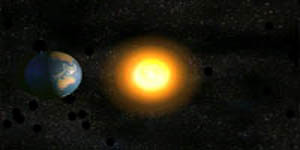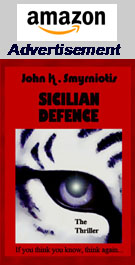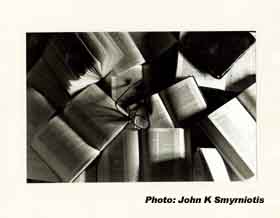
Imagine that you wake up one morning and it is your first day of life. You've never existed before. You realise you are on a train which is travelling at great speed through a dark tunnel. The train never stops, never leaves this tunnel. Now and again there are glimpses of a big world outside, a world too distant, and you have no means of getting off the train to that world.
New passengers are born on this train, just like us, and we see others grow old and die. So we appear out of nothing and disappear into nothing. We know of no other train like this, and no other people existing anywhere else.
Our train is well lit, very comfortable, well equipped, it has everything we will ever need our whole lives. And we make our journey a lot more enjoyable by studying and discovering ever new things on this amazing train. For example, we try to understand how it works and how to fix things that go wrong. But nobody knows for sure where the train started, nobody knows how any passengers got to be on the train at all. Nothing makes sense. Why are we travelling? Should we at least have a destination? Should the destination be the same for all, or different for each passenger? Some spend their whole lives trying to figure out just where this tunnel is and how the train came to be. This is called science and it can be extremely useful and very interesting. So a vast amount of knowledge has accumulated over thousands of years of travelling through this tunnel.


Even so, nobody knows for sure if there is a driver at the front - opinion is divided. Some even claim to have heard the voice of the driver, but others dispute this, and fights often break out between the passengers. To make things more confusing, there are instruction manuals found in some carriages, each claiming to be from the driver, but these manuals conflict with each other, and passengers of one carriage often set out to kill those in another carriage, simply because they disagree about the instructions.
This is our experience of living on planet earth. Science can give us a lot of knowledge about the train we are on and ourselves the passengers, something about the tunnel, a little about the world outside, and so on. But science can never answer our biggest questions. Every time science solves a puzzle, it discovers even more questions. In fact, cosmology and quantum physics reveal the world we consider familiar to be very strange and incomprehensible. And most of the big questions we face in our everyday thoughts are not scientific anyway.
Human beings invented the telling of stories very early on to try and make sense of all this. The advantage of stories over science is that they can deal with far greater complexity when the truth may be multifaceted or ambiguous in its very nature. Science has to be precise, but some great questions do not have such concrete answers. There are endless arguments, for example, about what we should be doing during our time of journey. Is there meaning to our lives, other than reproducing so that our children too can reproduce and then die? Does there need to be meaning or are we just like every other species? What is love, does it make us better human beings, should we even try to be better, and what is a better human being in the first place?
We also have philosophy to deal with such questions, but literature does something different: Philosophy looks for answers to each question, or rather it tries to define questions with great clarity; literature does the opposite, it broadens questions out, and discovers a multiplicity of valid possibilities. It creates worlds in which questions become concrete people and actions and things so we can see how answers might play out. Literature is a laboratory where the most complex experiments can be done, where we can run life itself in various ways, and see where it takes us, see what might happen in different situations. It is life's spreadsheet for entering different data to test infinite 'what if' scenarios and see what the result would be. And in this it has no other equivalent in the arts or in science.
Literature explores questions by transporting us into other worlds where we can experience various emotions as different people experience them. It gives us experience, not information. The arts, and here we talk about literature as an art, have the unique quality of revealing multiple facets simultaneously. Only in art is it possible to have two apparently contradictory aspects coexisting without intellectual conflict; since it is impossible for human beings ever to know absolute truth, the arts are our highest expression of our humanity and our highest intellectual achievement. Since we can only see things from one point of view at a time, art can place multiple views side by side so we can see them simultaneously. And literature can deal with large themes, and a multiplicity of themes, which may be loosely or directly related to each other.
Literature shows us that reality is never what it seems to be on the surface.
Initially, stories were myths, glimpses of the truth. While simple minds may have accepted those myths as gospel truth, for the brighter passengers of their time they were the stories that enabled the imagination to be fertile, and then give birth to science, philosophy and more literary stories. Those early glimpses of truth were no different to glimpses of literal light reaching the train from time to time via telescopes, from the universe beyond.
It was a great subsequent invention to deal with themes by telling fictional stories without any pretence that those events happened literally, but still telling us the truth, in other words revealing much greater, universal truths. Like our train metaphor, for example. The sophistication of some of those early stories is astonishing. Those were writers fully conscious of the great questions of life, the world they lived in and of the enigma of the human being itself - although, perhaps, we should not be surprised because what makes us human has not changed since then, and does not change simply by learning a lot of hard facts. Homer's Odyssey asks profound questions, such and so many, we could not start to list them here. Almost two and half thousand years before Cervantes (c.1600 AD) - considered the father of the modern novel - Homer (c.800 BC) produced a work which was consistent, and dealt with the nature of reality itself, what is truth and how do we ever find it - a question which later defined all of Greek civilisation, which in turn defined subsequent civilisations including our modern world.

Cervantes
So how can literature be so powerful as an art? We know a story is made-up before we read it, so how can it grip us, move us, enlighten and change our views, change who we are, change our lives even?
A simple answer is that literature is like a mirror, what Shakespeare called, 'holding a mirror up to nature.' All art enables us to step outside ourselves and to see things from a different perspective, to experience ourselves as something else, or to experience the world as someone other than ourselves. Going back a step, this is the essential difference between art and science: Science informs us, but art transmits an experience. Likewise, a piece of writing may inform or entertain us, but only literature imparts experience. A travel journalist can give us a very accurate picture of what a place is like, but only literature (a great poem or novel) can confer the range of thoughts and emotions of actually being there.
Poetry delivers a more concentrated dose of transmitted experience. Poetry tends to be a more condensed articulation of meaning and therefore it may feel more intense. It is the most conscious and structured of all language. In poetry, a writer may seek to extract the very essence, sometimes completely divorced from any examples. It needs to be said that not all verse is poetry.
Plays and film-scripts are just as much part of literature, if they have certain qualities. But it is important to remember that literature is purely about words. The production of a play or a film is a different art form altogether, and film adaptations of novels have nothing to do with the original as an art form.
This is a reminder that reading literature is an experience like no other. It is totally different to seeing a movie, different even from seeing a stage production of a play where the same words are spoken out. When reading, the brain constructs its own images, even sounds, constructs whole new worlds, whereas in watching a play or a film the imagination is very much dictated to by a whole host of other (talented) people, such as the actors, the director, and even the cameraman. Watching a film can be a challenging mental process, like reading is, but of a very different kind.
In the age of space exploration and the internet, our need for stories is as strong as ever. Novels, films, plays, even television soap operas are flourishing, but again not all of that is literature.
Prose fiction comes in all kinds, each very different from the others. Much of it has been written for, and provides, no more than simple entertainment (and we all need light entertainment at times) whereas a true literary story can be so complex that it is impossible to find an end to its views - the more we analyse it, the more layers and interconnections we discover, literally without end.
THE EDUCATION OF THE FEELING
Such layers and interconnections in a piece of literature are not artificial, they reflect the complexity of real life and of the world we inhabit. So 'education of the feeling' can mean two different things, a) the 'feeling' of a particular work of art, how we perceive it and how we respond to it, and b) feelings in the common use of the word, as in "That's how I feel about it."
We deal with the world from moment to moment with our five senses plus our intellect, but also our emotions. Everything produces an emotional response in us of some kind. When we are confronted by complex choices in our lives, understanding the facts is crucial but not enough.
Science educates our intellect but cannot educate our feelings, not even a PhD in psychology can do that. And all our feelings need educating. Just because we feel a certain way does not mean we are right to feel that way.
We talk about an intelligent response to art under The Arts in General, and we talk here about day-to day feelings and our emotional education, starting from childhood to, hopefully, being grown-up.
Our feelings can be wrong in different ways.
- Wrong emotional reaction to the event, e.g. feeling fear instead of joy, and so on - more examples below.
- Correct feeling but its strength out of all proportion to the event.
- A narrow range of emotional responses, no matter what the event.
- Confusing feelings for thoughts, and vice versa.
In daily life we see the wrong feelings aroused altogether, as in people who hate perfectly good individuals or love a pet animal more than their child, or fall in love with a 'celebrity' they know superficially and have never met. Any normal emotion can be inappropriate at times or even perverse, like feeling satisfaction instead of anguish at seeing injustice, even inflicting injustice, as in 'I suffered, why shouldn't he?' Some abusive parents feel like that towards their own children, while others enjoy watching unprovoked rudeness, put-downs and humiliations, even violence, which should cause revulsion, not pleasure, in a grown-up.
Others may feel the right emotion at the right time, like feeling hurt, but the strength of it is out of all proportion to the situation, as in 'I never want to see you again,' when a simple mistake is pointed out to them. They may be offended by trivia while ignoring the good will shown to them, they constantly betray uneducated feelings, and this includes some highly qualified people, like doctors who hurt or harm vulnerable or knowledgeable patients, or judges who feel that teaching an honest layman his place is more important than justice and knowingly pervert the case.
Powerful dictators may kill millions 'believing' (actually feeling) that some abstract concept, like national glory, is far greater, and that the pain of a whole population is less important. At the other end of the scale, you might hear, "Why should this chicken die for me to eat?" while a juror in a court of law may pity a mass murderer or child-killer.
All of them are emotionally immature like children who burst into tears at the sight of a new face or when granddad picks them up (fear instead of joy), obviously distraught, or toddlers who hit other children they do not like. And most adults recognise those as childish, uneducated feelings - the only difference being that the adult bullies of this world know what they are doing and that is what makes them evil.
Some insist that feelings 'can't be helped' and want to leave it at that; they let their lives be blown hither and thither by uneducated emotions like a feather in the wind, without any self-discipline. They fall in love because of an inconsequential characteristic in someone totally unsuitable, so they get married, they fall out of love, or 'meet someone else,' so they separate; they want a baby so they have one, then regret it and walk out, then have another one, and so on, never learning how feelings work, when to heed them and when to let their brain override them.
Others have feelings which are neither inappropriate nor disproportionate, they are in the middle range, but because their emotional makeup is uncultivated, they have a very narrow range. They always feel the same, no matter what happens.
These are obvious examples, but our feelings can be very wrong in more subtle ways, difficult to recognise.
What literature does is to put before us the full range of emotional responses so we too can experience them vicariously and are able to judge them without being involved in the event. Those educated in the feeling can have available to them an entire range of emotions, always appropriate to the event and with proportionate strength, or at least they can recognise the subtleties of getting one's own feelings wrong and control them. Literature "holds a mirror" up to us, gives an opportunity to see emotions from a higher perspective, whether Iago's destructive jealousy or Romeo and Juliet's all-consuming passion, so we can see ourselves in a better light.
Literature teaches the importance of love as supreme, against trivial sentimentality. In a world where higher values, such as wisdom, humility and love are demeaned in favour of success, upmanship and self-importance, many do not even know what love is, nor why it is important, and they suffer a diminished existence as a result. They confuse love with sexual desire or feelings of infatuation, or at best consider love as a luxury in their hectic lives where a regular climax is enough. They speak of 'finding love' but they mean acquiring a partner; they have not learned that love is something inside ourselves, regardless of any relationships, not something to be found out there. So-called romantic fiction may be partly responsible but, as we set out, that is not literature as we discuss it here, as an art.
Art transmits experience, rather than information, and will help us to grow into more rounded, emotionally mature adults.
"The ultimate justification of the work of art is to help the spectator to become a work of art himself." Bernard Berenson
The education of the feeling enables one to see how love differs from
such ephemeral emotions, it is not just something we feel from time to
time, or with a sexual partner, it is more profound, part of our fundamental
makeup, it changes who we are. Literature shows how otherwise rich lives
are impoverished without love, no matter what their relationships and
achievements, or how people who have no love impoverish the lives of others
around them, regardless of what else they may offer. For those who never
received love, literature as an art transmits that experience, so they
too can recognise it and grow to have it, then learn to give it and also
receive it as a result.

Homer
So what should the serious reader be aiming or hoping to get from quality literature? It depends on whether the question refers to one single book/play/poem, or literature as a whole. But what we should not want is the imparting of information, or solutions to specific problems. If we are talking about a single work of literature, the simple answer is this: if the writer can offer quality, then that means he is offering some great universal truth and an emotional experience worth having. In turn, truth and experience change our very core, change who and what we are, in the same way that sight dispels blindness and enriches our experience of the world.
But literature as a whole cannot be summed up in one answer. If it is impossible to find an end to the aspects and views of one great novel, this is more true of literature as a whole. The study of literature can take a lifetime, and after a lifetime there will be more questions unanswered than at the start - a good result. We live in a universe beyond finite description or comprehension, so having questions is the equivalent of seeing where others might be unsighted. If we spend our whole lives on just one discipline, whether science, philosophy, mathematics or the other arts, we shall become a single-faceted mind of narrow interest, no matter how serious that interest.
So literature is one of the necessities for the complete man. To not have delved into literature is like walking through life with one of the senses missing. One can survive perfectly well without either sight or hearing or taste or smell or touch, but to not have one or more of those senses is to degrade one's understanding and experience of himself and of the world one lives in.

Shakespeare
WHOSE LITERATURE IS IT ANYWAY?
Literature is not an Anglo-Saxon thing, although you might think that, listening to some lectures at English universities. Every civilisation, every nation, every region of the earth, every tribe has produced literature in some form, and most of them literature of supreme merit. As already mentioned, Homer wrote the best novel ever, the Odyssey, around 800 BC, and the ancient Egyptians were writing stories that might be called novels almost two thousand years before him.
The arrival of English literature on the scene is a recent event. School children in England might think Shakespeare is very old language, let alone Chaucer, and we will not even mention so-called Old English, as in Beowulf. Yet we are talking about things written just a few hundred years ago. The Odyssey was written over two and half thousand years ago, it is studied in the original by school children of equivalent age in Greece, it is widely read in translation throughout the world, and it is accepted as a literary masterpiece.
None of this is being disputed, of course, and yet students of literature and their tutors at British universities will tell you they are reading "English," while their equivalent at Greek universities will tell you they are studying, not Greek, but literature. These are not just linguistic shortcuts. They show something fundamental about a way of thinking.
What is the significance of these differences?
The Greeks see literature as an art, like music or painting. If you were studying music, you would never say I am studying German, or English, or whatever. The music may be very English or very German in its history, colour, idiom or expression, but it is recognised that there is something about music which transcends its national origins. Literature, of course, has to be written in a particular language, but it still transcends the language it was written in. An English novel or poem has much more in common with a German novel or poem than with any English newspaper article or an English footballer's memoirs.
And yet, the fact is that Anglo-Saxons see literature very differently from others. When he says, "I am studying English," the British student sees literature as a study of Englishness, English character, English society and so on, whereas in the same example the Greek student sees it as a broader study of the art of writing, human nature, or a study of the complex world humans inhabit. The English student is preoccupied with judging the characters in a novel; the Greek student is primarily judging the author - in the sense of analysing why the author has written this, how it fulfils his / her objectives - what truth is the author trying to reveal to us, as opposed to what a character reveals about himself.
If we are talking about the novel, the Anglo-American tradition is of character-based, narrative novels, unlike most of European literature, for example. This does not mean that all Anglo-American literature is character based, but the bias is so strong, it does pervade the study of, and approach to literature. And there is an underlying cultural (perhaps genetic) reason for this in a race which instinctively dislikes the more analytical / philosophical view of the world. Anglo-Saxons have always been more interested in the messenger than the message, hence a certain type of celebrity culture, a plethora of television so-called 'reality' shows and 'personalities'.
It should be said, that the exploration of character in literature is important, but the fault, if it can be called that, in some Anglo-Saxon minds, is to think that character is the most fundamental aspect of literature. Indeed I have met lecturers and publishers who think it is the sole purpose of literature. And of course it is not, other aspects are equally important, and sometimes more important.
As a British university student myself, I sat through many lectures which did nothing more then extend the author's narrative on a particular character. And I sat through one particular lecture and watched Dr Michael Slater writhe for an hour trying to understand Shakespeare's Coriolanus and admitting defeat in the end. He kept confessing he just could not make any sense of Shakespeare's characterisation of Coriolanus. It would not occur to Dr Slater that this play was not about character, it was primarily about abstract ideas. Dr Slater just could not break from that frame of mind; to him, literature could only be the study of character. This was an extreme example, but a good example of how blinkered an otherwise learned view can become.
The Anglo-Saxon preoccupation with character as the sole or main purpose of literature is like saying that all paintings should be portraits. That would be a very narrow-minded view of the world; we would not tolerate it in any of the other arts, yet we tolerate it in literature. This diminishes rather than elevates the art of literature and it can be said the English do not take such a lofty view of literature anyway, more of a down-to-earth, less cerebral approach. University lecturers who spend the entire hour on a major work talking about just one character leave their students blinkered. I have witnessed sessions of literary criticism with a closer resemblance to gossiping about strangers down the pub, or teenage girls comparing boyfriends.
Many Anglo-Saxon publishers confess to looking simply for likeable characters in deciding what to publish. Most of Shakespeare's works and the very best of world literature would never have made it. This lopsided view of characterisation as the be-all and end-all of fiction demeans and debases the role and the nature of literature in the modern English-speaking world, and leads to the publication of many inferior works.
CHARACTER AND PLOT
In complex works of art, the characters are just one of many elements. Plot, structure, the choice of style, the themes, literary devices etc., and the characters are all as important as each other. The plot is not what the characters do, the plot changes what the characters would have done otherwise, just as in real life, we do not always behave as we would want, we are regularly overtaken by events or the actions of others forcing us to act differently, even out of character. The plot has a life of its own. In other words, what happens in a story with plot is not the same as what the characters like to do from moment to moment when being true to themselves. Plot adds another dimension. The plot shows how characters are affected by other factors, such as unpredictable combinations of circumstances.
In quality fiction, the characters change through the course of the story and are always different by the end. This is what gives meaning to the characters of a novel, for example. Otherwise, it is like reading about the life of a celebrity in tabloid newspapers - entertaining it may be, even informative, but with no depth of meaning.
What is it in a story that changes a character in that story? The author cannot simply change a character, that would be bad writing and render the story meaningless or unreadable. In order to have meaning in literature, we need cause and effect. In order to have depth of meaning, this causality must be exposed through plot. When we see a character change, we know exactly what happened to effect that change.
So, plot is not the same as story. Plot means causality. In a well made novel, nothing is redundant, and there are no loose ends left. It is also possible, of course, for a writer to place too much weight on the plot, as in a thriller, for example. This would be no greater or lesser fault than the equivalent fixation with characterisation.
Quality novels with a great plot are not any less concerned about the psychology of the characters. They simply acknowledge that the two are inseparable. Many English novelists admit to difficulty constructing a good plot. This may be cultural or even genetic, in the same way the English language reflects a set of rules (for grammar or pronunciation) with no basis other than "that's the rule." And this is how some English novelists like to construct their novels: "This is what my character did. This is his nature, so that is what happened; what do you mean causality?" For example: "Chapter 10: Today Bob and Clara decided to go away for the day and this is what happened next." There was nothing in previous chapters to give a reason for them going away, they just did; they might have done something different. In a more literary piece, the exploration of character may be more interesting and sophisticated, but the absence of plot still means that this is inferior work.
What we are talking about here is not the same as the Victorian distinction between novels of plot and novels of character. Quite the opposite. The point is that character, plot, style, themes and all other aspects of a story as a work of art are equally important and indispensable parts, and none should be elevated to the detriment of the others.
We started this section by describing how characters change throughout the story in quality literature. By quality literature we do not necessarily mean so-called literary fiction. Popular or commercial fiction can be quality fiction, if it reaches a certain standard, while literary novels can be as accessible, readable and entertaining; or equally they might lack quality. The only commercial disadvantage of quality novels being that very few people can write them and publishers need to produce quantity in order to survive, so the publishing of inferior works has proliferated.
E.M. Forster pointed out, in his "Aspects of the Novel", that popular novels have flat characters, shaped around a single characteristic, and then they keep behaving true to type, but, he said, competent writers can make them seem convincing; whereas literary novels have round characters who display "the incalculability of life", who keep changing or growing, who are complex and cannot easily be fathomed out - one needs to read the entire novel to begin to understand them.
But the distinction is not as clear-cut, the line is blurred. In popular or commercial fiction, quality means that the characters grow and change even though they may not be "in the round." Quality also means that the plot has no loose ends, and it means that the feelings and thoughts the story deals with are not from the trivial aspects of life.
My own novels
are more about the plot as a way of exploring the
 complexities of life, and about ideas which find expression in what happens
to the characters, rather than what the characters do. In my stories,
the intellectual and aesthetic satisfaction in the reader's mind long
after he has finished reading is more important than the short-term pleasure
during reading. Conversely, when I write a thriller, the focus is on the
action and how complex situations develop beyond the control of the hero;
what the reader feels during reading is an ever-rising tide of suspense
and fascination, which starts from zero and reaches a crescendo by the
end.
complexities of life, and about ideas which find expression in what happens
to the characters, rather than what the characters do. In my stories,
the intellectual and aesthetic satisfaction in the reader's mind long
after he has finished reading is more important than the short-term pleasure
during reading. Conversely, when I write a thriller, the focus is on the
action and how complex situations develop beyond the control of the hero;
what the reader feels during reading is an ever-rising tide of suspense
and fascination, which starts from zero and reaches a crescendo by the
end.
This is the opposite to many novels I have read, which start interesting but soon flatten out, and may lose their way or become repetitive or predictable. Publishing constraints and the selection process means that such front-loaded books are favoured, so there are far too many books which grab your attention to start with but never fulfil their promise. It is because of novels like this that the book-buying market has shrunk; readers have had far too many disappointments.
THE GREEKS HAVE A WORD FOR IT
In English, anyone who writes is called a writer regardless of the type or quality of their work; clarification may be substituted, such as poet, journalist or novelist. But the Greeks have one additional word with no equivalent in English: Logotehnis. (Literature is Logotehnia, literally word-art.)
![]()
In Greek, writer is Sygrafeas and novelist is Mythistoriographos, but Logotehnis means someone whose writing is an art form, in other words not just any poet or novelist, not just any writer. This is not the equivalent of wordsmith, which can refer even to a good journalist - Logotehnis is aiming higher, it means the equivalent of a Picasso or a Mozart. Unsurprising, if one thinks that the Greeks produced literature in its highest form two and half thousand years ago, including plays still performed world-wide in mainstream theatres today.
There is also an equivalent difference if fundamental beliefs about writing itself. In the Anglo-Saxon world it is believed that almost anyone can learn to be a writer or even a novelist, and talent is often attributed simply if the product is published; we often hear of first-time novelists as "new talent" on no other qualification. The Greeks do not use such matter-of-fact definitions. Talent is not automatically attributed on such considerations; ordinary readers will often criticise a published work with "he has no talent." The Greeks believe that, to have talent for writing literature you have to be born with it, similar to the Anglo-Saxon belief in musical ability or a gift for creating great paintings, and therefore you either have it, or you don't.
Logotehnis is someone who creates art out of words. Certain technical skills have to be learned, of course, the Logotehnis may be born with a gift, but he still has to learn how to read and write, to learn a vocabulary, plus also, he has to learn so much about life, the world he lives in, and about people. So he may be born a Logotehnis but neither a writer nor a novelist yet, just like Mozart had to learn to read music, learn to play the piano and learn about all the other musical instruments, as well as the full range of human emotions. But the gift of being a musical genius could never be learned. How Mozart put his acquired knowledge together to create a masterpiece - that was unique to him, that could never be taught. And when it comes to saying something worthwhile, significant and substantial in the form of a great work of literature, how a writer sees the world and how he says it - that can only come from innate talent.
As a result, the Logotehnis give us something very different from ordinary writers. In each story, he or she give us a whole world to wander around in, a world of his own making, which is just as complex as the real world, a world which is fascinating and worth exploring, not just a few characters saying things and doing things to each other.
And that is why very few people can create a great novel. This ability to create a work of such complexity, beyond even the analysis of its creator, involves so many different abilities, it can never be done by following a set of rules.
LITERATURE AND THE HUMAN BRAIN
 So,
the definition of talent must be an ability which cannot be acquired through
any amount of hard work, but is inborn, i.e. genetic. A great work always
transcends the intentions of its writer, however profound those were.
Pressure to solve problems comes from the unconscious, a subconscious
which constantly asks questions and sees problems others do not. People
with talent as writers can create stories of such great complexity, beauty
and meaning, that the process becomes unfathomable.
So,
the definition of talent must be an ability which cannot be acquired through
any amount of hard work, but is inborn, i.e. genetic. A great work always
transcends the intentions of its writer, however profound those were.
Pressure to solve problems comes from the unconscious, a subconscious
which constantly asks questions and sees problems others do not. People
with talent as writers can create stories of such great complexity, beauty
and meaning, that the process becomes unfathomable.
Also a Logotehnis does not have to search for ideas. Unlike ordinary minds who would like to write a book, or attempt to, new ideas arrive in his/her head all the time - so many, it is impossible to write them all. The complexity of a single work is multiplied to infinity by all the other works he will never have time to write. The fact that this can exist inside a brain, a lump of fat and protein the size of a bag or sugar, is as awe-inspiring as the vastness of the universe.
The experience of the gifted writer is that of a novel arriving in his head all at the same time. Suddenly, it is all there, not just the idea but the full complexity of it. He cannot tell you the details yet because he needs to travel through that thing in his head, but he knows every detail is in his head in the same way a pianist knows a piece by heart but cannot actually tell you from memory, if you ask him at random, to name the notes in a particular bar, or like an artist who visualises a new painting but cannot tell you the exact colours, brushstrokes or forms he will use.
The hard task then begins of putting this novel down on paper. In the case of the great writer, the story dictates every detail to him. It is as if there is only one possible choice at every point, even though he may be aware of other alternatives which are dismissed as inferior, or contradictory to other aspects of this work. That is why writers find novel writing a truly exhausting experience, because they need to hold the entire novel in their head constantly. They must remember every detail they have written plus those they have not written yet. Each detail reveals itself at the appropriate time.
I told a friend once "...The novelist mustn't lie." And she looked at me dumbfounded, as if to say, but this is not truth, this is fiction; surely the author can write whatever he likes. Alas, no. Yes it is fiction, but fiction is not lies - there was no claim that these events happened literally - fiction is a revelation of greater truths. Yes, it is fiction but the author still must not lie - he must never make things up just to push the story along when stuck with some technical problem or structural difficulty, or to please his publisher or his imaginary reader. A work of literature must have integrity and consistency. The gifted author must tell the story as it was given to him, he must not lie.
The sheer effort of this task drains the writer over time. He has to make great sacrifices on our behalf, and to search the deepest depths of his mind, some of which may be painful. But this is the great writer, and the artist who can dig into mountains and find the gold and the diamonds.
The renaissance discovered, or at least told us, "What's inside a man, can be a whole world." John Le Carre' once said about Graham Greene: "When you see so brightly, you are on a different level of human behaviour."
Literature makes it possible for lesser mortals to look inside such minds, and that is something truly wonderful about possessing a human brain.
© John K
Smyrniotis
London 2014

